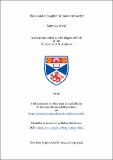The sound of laughter in Romantic poetry
Abstract
This thesis offers the first critical examination of the sound of laughter in Romantic poetry. Part one locates laughter in the history of ideas of the seventeenth and eighteenth centuries, and explores the interplay between laughter and key intellectual, aesthetic, ethical, and social issues in the Romantic period. I chart a development in thinking about laughter from its primary association with ridicule and the passions up to the early decades of the eighteenth century, to its emerging symbiosis with politeness and aesthetic judgement, before a reassertion of laughter’s signification of passion and naturalness by the end of the eighteenth century. Laughter provides an innovative means of mapping cultural markers, and I argue that it highlights shifts in standards and questions of taste. Informed by this analysis, part two offers a series of historically aware close readings of Romantic poetry that identify both an indebtedness to, and refutation of, earlier and contemporaneous ideas about laughter. Rather than having humour or comedy as its central concerns, this thesis identifies the pervasive and capricious influence of the sound of the laugh in the writing of Robert Burns, William Blake, William Wordsworth, Samuel Taylor Coleridge, Leigh Hunt, Lord Byron, Percy Shelley, and John Keats. I detect the heterogeneous representations of laughter in their work that runs across a diverse range of genres, poetic forms, themes, and contexts. As such, I argue against the serious versus the humorous binary which prevails in literary criticism of Romanticism, and suggest that laughter articulates the interplay between the elegiac and the comic, the sublime and the ridiculous, the solitary and the communal. Moreover, I detect a double-naturedness to the sound of laughter in Romantic poetry that registers the subject’s capacity to signify both consensus and dispute. This inherent polarity creates a tension in the poems as laughter ironically challenges what it also affirms. Never singularly fixed, the sound of laughter reveals the protean nature of Romantic verse.
Type
Thesis, PhD Doctor of Philosophy
Rights
Embargo Reason: Embargo period has ended, thesis made available in accordance with University regulations
Collections
Items in the St Andrews Research Repository are protected by copyright, with all rights reserved, unless otherwise indicated.

